Mission of US Sailing
The mission of US Sailing, as the National Governing Body for the sport of sailing in the United States, is to increase sailing participation and excellence through education, competition, and equal opportunity while upholding the principles of fair play, sportsmanship, and safety51.
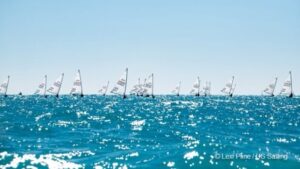
Vision for the Future of Sailing
US Sailing envisions a future where sailing becomes a rapidly growing sport in the U.S., driven by innovations in access and education, inspired by American success in international competition. The diverse sailing community is aligned around common goals for the sport, with sailing being embraced by the public as inspiring, inclusive, and accessible5.

Core Values
US Sailing operates based on a set of core values that guide its actions and decisions:
- Respect
- Integrity
- Excellence
- Collective Success
- Clarity and Transparency
- Sustainability
These values underpin US Sailing’s commitment to serving the sport of sailing since 1897 and reflect its dedication to promoting fair play, sportsmanship, safety, and continuous improvement within the sailing community5.
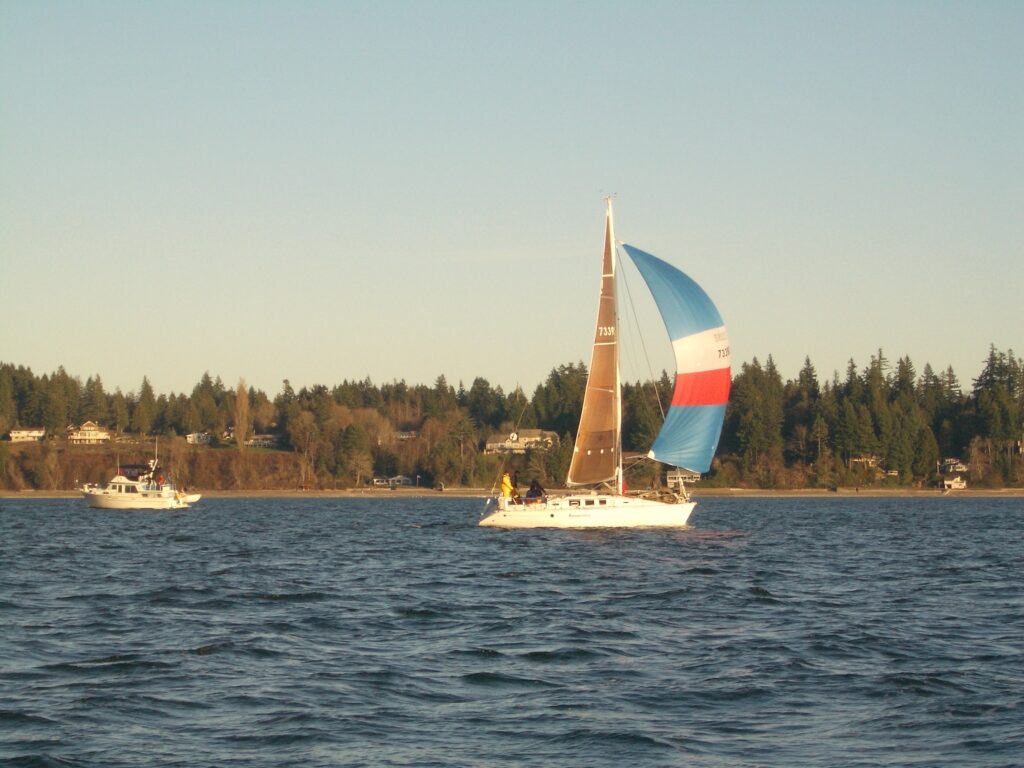
The values underpinning US Sailing’s commitment, such as respect, integrity, and excellence, appear to be in conflict with the lawsuit involving Paul Cayard and the America One Foundation. The lawsuit includes allegations of breach of contract, tortious interference with business relationships, misappropriation of trade secrets, unfair competition, defamation, and false light against Cayard, Ruh, and AmericaOne. These accusations suggest a departure from the core values of respect and integrity that US Sailing upholds123.
Misalignment with Core Values:
- Integrity: The lawsuit implies breaches of integrity through allegations of tortious interference with contracts and misappropriation of trade secrets. These actions contradict the value of integrity that US Sailing stands for123.
- Respect: Accusations of defamation and false light against Cayard, Ruh, and AmericaOne indicate a lack of respect for US Sailing’s reputation and business relationships. This behavior goes against the principle of respect that is fundamental to US Sailing’s mission123.
- Excellence: The legal dispute and associated actions may divert attention from achieving excellence in sailing by creating distractions within the sailing community. This situation could hinder the organization’s pursuit of excellence in education, competition, and athlete support123.
The lawsuit involving Paul Cayard and the America One Foundation raises concerns about how these legal conflicts align with the values that US Sailing aims to uphold in promoting fair play, sportsmanship, and safety within the sailing community123.
In the context of US Sailing, William J. Ruh, from Del Mar, California, is the Chair of the US Sailing Foundation. Ruh has been actively involved in leading the US Sailing Foundation and its board members, playing a crucial role in supporting and advancing the organization’s programs and initiatives aimed at inspiring Americans in the sport of sailing123. Additionally, Ruh’s involvement in the foundation has been instrumental in providing key resources to support US Sailing’s various programs and activities, contributing to the growth and development of sailing in the United States123.
The America One Foundation is a significant private financial supporter of the U.S. Sailing Association (USSA) and the U.S. Olympic Sailing effort. The foundation has been deeply involved in providing substantial support to American sailors, including financial assistance, coaching, physical fitness guidance, and various forms of support for athletes at events, camps, clinics, regattas, and World Championships13.
Paul Cayard has a professional relationship with Larry Ellison, primarily through their involvement in America’s Cup campaigns. Assets of AmericaOne, a syndicate led by Cayard for the 2000 America’s Cup, were eventually sold to Larry Ellison, who used them to further his own America’s Cup endeavors.
Reasons for Lawsuit:
- Breach of Contract: The lawsuit filed by U.S. Sailing against the America One Foundation and its principals, including Paul Cayard, alleges that AmericaOne breached a contract to fund a project called “Project Pipeline.” This project was initiated by US Sailing with a $5 million gift from the AmericaOne Foundation. The lawsuit claims that AmericaOne was obligated to pay the pledged $5 million over a 10-year period in annual installments but notified US Sailing in March 2023 that it would no longer make these payments, citing a lack of confidence in US Sailing’s ability to make the project successful3….
- Civil Conspiracy: US Sailing’s complaint includes claims of civil conspiracy against Cayard and Ruh, alleging that they induced AmericaOne to breach its commitment to fund Project Pipeline. The lawsuit also alleges that US Sailing suffered significant losses due to Cayard, Ruh, and AmericaOne interfering with its business relationships with donors and sponsors3.
- Disparagement: Additionally, the lawsuit accuses AmericaOne of disparaging US Sailing’s reputation as the national governing body for sailing through wrongful conduct and intentional harm to US Sailing’s business and reputation within the sailing community and Olympic movement3.
The legal dispute between U.S. Sailing and the America One Foundation has led to significant tensions within the sailing community, with prominent figures like JJ Fetter and Paul Cayard expressing discontent over the lawsuit and its implications for American sailors and the Olympic sailing program14.
JJ Fetter and Paul Cayard are unhappy with U.S. Sailing due to a federal lawsuit filed by the organization against the America One Foundation and three of its principals, including Paul Cayard. The lawsuit has led to significant discontent within the sailing community, particularly among prominent figures like JJ Fetter and Paul Cayard13.
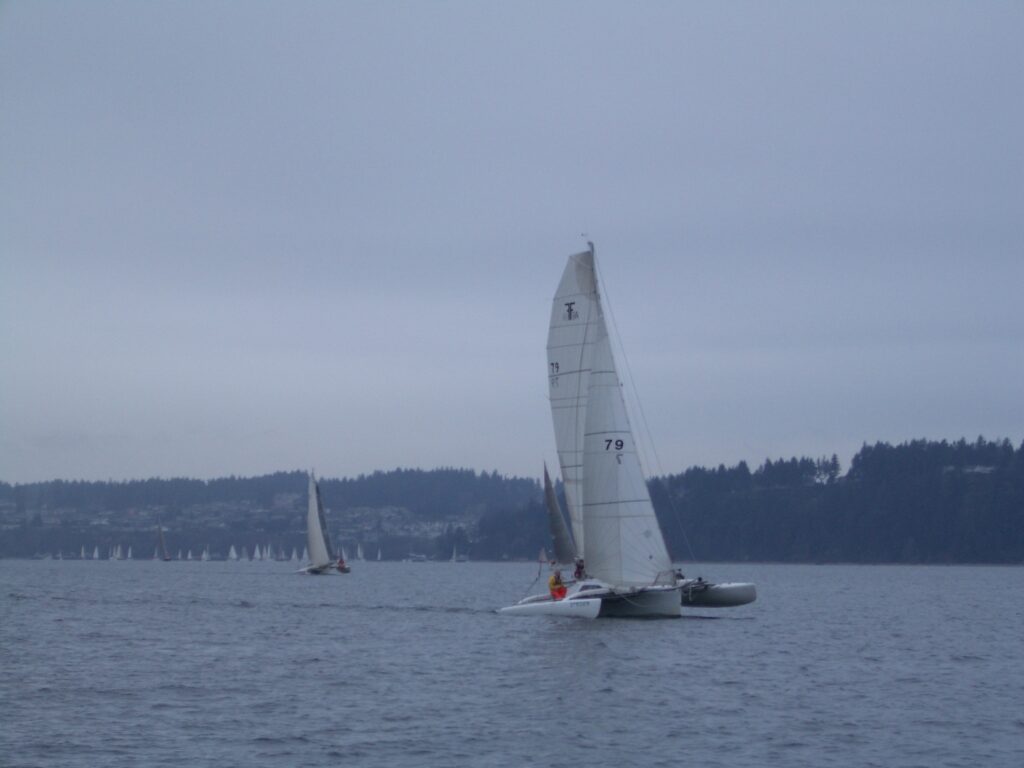
Reasons for Discontent:
- Lawsuit Dispute: U.S. Sailing’s lawsuit against the America One Foundation and its principals, including Paul Cayard, has been a major point of contention. JJ Fetter has called for the resignations of U.S. Sailing’s CEO, Alan Ostfield, president, Richard Jepsen, and any board member supporting the lawsuit, criticizing the governing body’s actions13.
- Impact on Olympic Program: The lawsuit and associated disputes have raised concerns about their impact on the Olympic sailing program. The legal battle and internal conflicts have been viewed as distractions that could affect the performance and focus of American sailors in international competitions13.
- Resignations and Restructuring: Paul Cayard’s resignation as the head of the US Olympic Sailing Team following a restructuring at US Sailing has added to the turmoil. The restructuring aimed to reallocate resources within the organization to better support athletes leading up to the Paris 2024 Olympic Games2. Paul Cayard was previously the head of the US Olympic Sailing Team The restructuring at US Sailing led to a change in roles, separating responsibilities into two positions: a Head of Olympic Operations , Sally Barkow to focus on team operations and a second position dedicated to fundraising for the team which Cayard was expected to fill. This restructuring resulted in Cayard’s resignation as it did not align with the role he had initially signed up for1.
The dissatisfaction expressed by JJ Fetter, Paul Cayard, and other members of the sailing community underscores the challenges and tensions within U.S. Sailing related to governance, legal disputes, and organizational restructuring.
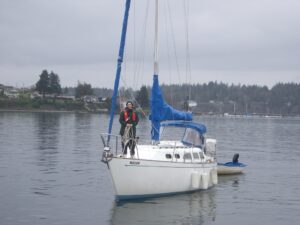
Paul Cayard is currently serving as the President of the International Star Class Yacht Racing Association, a position he took on following the resignation of Tom Londrigan in October 2023. The Stars are no longer an Olympic class vessel. He will perform the duties of the Star Class President through 2025123. Cayard has a long and storied history with the Star Class, having begun sailing Stars in 1977 and achieving significant success, including winning the Star Worlds in 1988 and being a 10-time Silver Star winner2.
In addition to his role as Star Class President, Cayard is also known for his extensive sailing career, which includes being a two-time Olympian, a seven-time America’s Cup sailor, and the winner of the Louis Vuitton Cup and the Whitbread Round the World race. He is a member of the US Sailing Hall of Fame and a Rolex Ambassador26.
Cayard’s recent activities also included serving as the head of the US Olympic Sailing Team, a role from which he stepped down in February 2023 following a restructuring at US Sailing8. His departure from this role was part of a broader operational restructuring of the US Sailing Team in preparation for the Paris 2024 Olympic Games8.
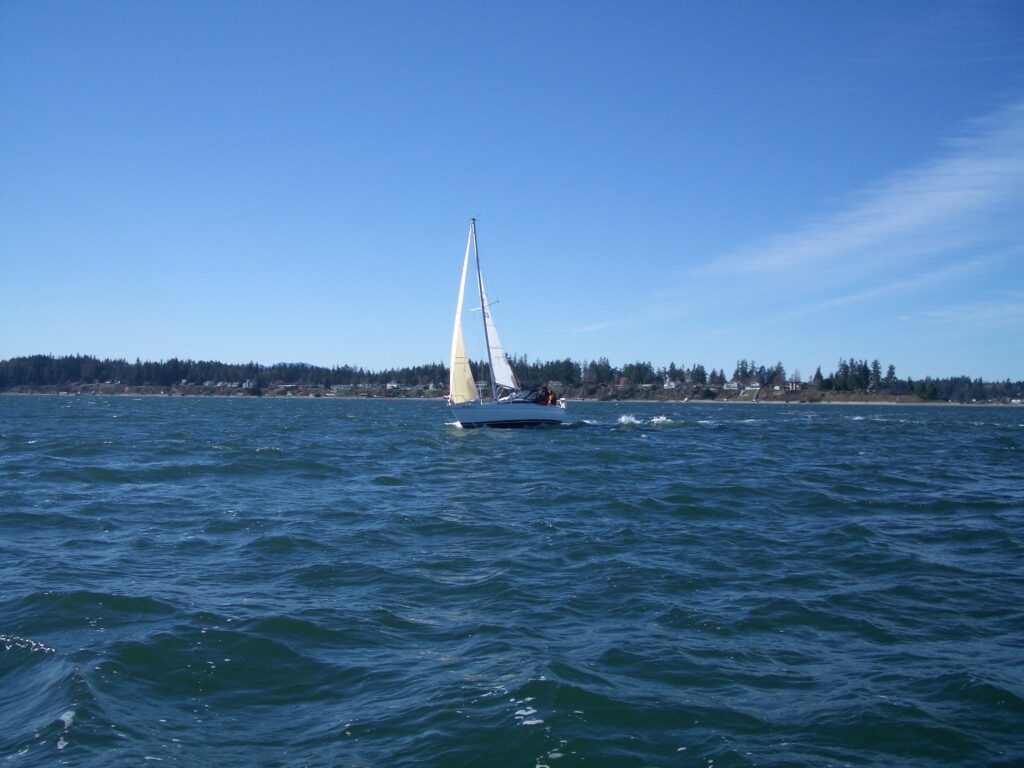
With American sailors in an Olympic slump, two-time medalist JJ Fetter is calling for the resignations of U.S. Sailing’s CEO, president and any other board member who supports a federal lawsuit against a sailing foundation and three of its principals. What is wrong with U.S. Sailing and how did it get to this place? Why support U.S. Sailing?
The current situation with U.S. Sailing involves a lawsuit filed against the America One Foundation and three of its principals, including former Olympic team boss Paul Cayard. This legal dispute has led to significant controversy within the sailing community, with two-time Olympic medalist JJ Fetter calling for the resignations of U.S. Sailing’s CEO, president, and any board member supporting the lawsuit124.
“[I]n the final run-up to this year’s Olympics, we have been laser-focused on providing support for our American sailors. US Sailing should be doing the same,” said AmericaOne Foundation Chair Lawrence G. Finch in a Jan. 22 statement. “Unfortunately, instead of putting their efforts into what matters most — our Olympic athletes — US Sailing is pursuing a meritless lawsuit against AmericaOne. Despite the unprecedented levels (over $6M) of assistance AmericaOne has provided to USSA and our sailor athletes over the past 15 years, USSA is actively defaming our reputation.”
AmericaOne’s chair calls US Sailing suit ‘unfathomable’
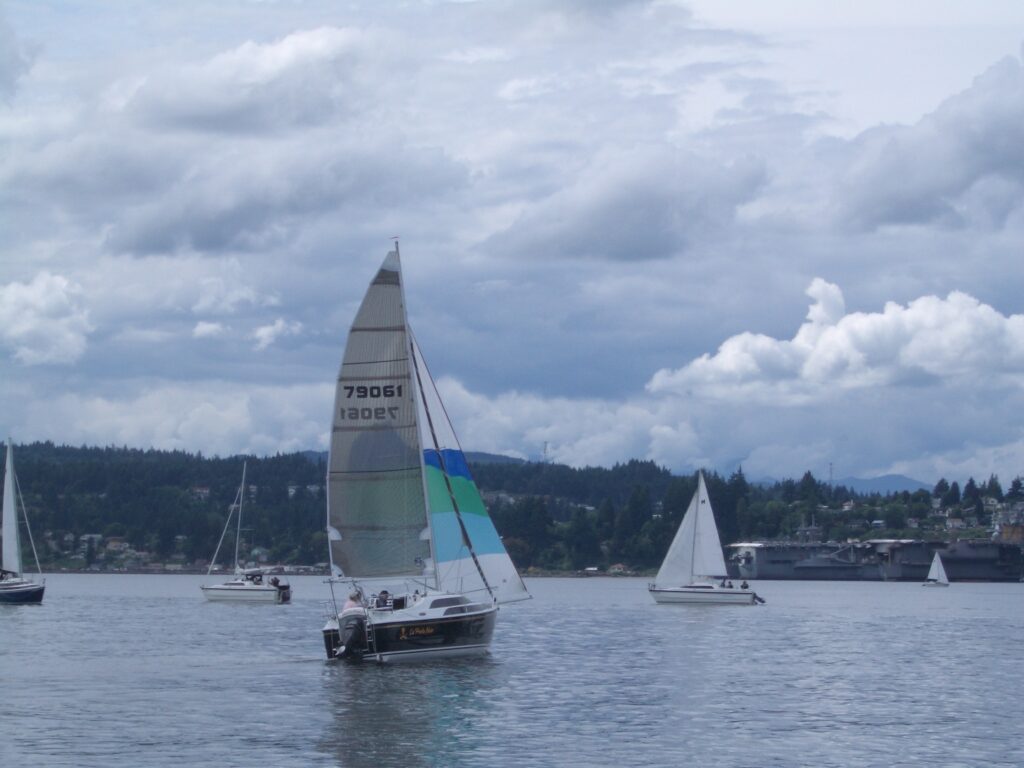
Prior to the arrival of Bill and Paul, US Sailing had no significant donors and a multimillion-dollar hole in its Olympic budget. Upon starting his employment, Paul was asked to defer half his salary, which he accepted. In 2021-2022, Bill and Paul — through their own personal contacts — secured $18 million in commitments for our U.S. Olympic effort. Every donor committed because they could see a clear plan to support sailor athletes, a plan focused on returning the U.S. to the Olympic podium, credible leadership, and responsible oversight of the funds. The Olympic department of US Sailing has always been on its own to fundraise for itself, and because of this, it had to operate on a meager budget. Our results over the past cycles reflected that lack of investment in our sailors. At some point, US Sailing began charging the Olympic department an “administrative fee” — which the Olympic department had to cover itself from its own fundraising. In 2022, Paul and Bill became concerned about the amount of this fee and how it was continuously increasing. The final straw came when USSA decided to double the fee — now almost 7 figures — for 2023. Paul objected in writing to USSA CEO Alan Ostfield and the US Sailing Board, explaining how this fee would take significant donor-dedicated funds out of athlete hands without providing commensurate value. Unable to convince the Board, Paul, Bill and the entire coaching staff resigned in protest.
Because donors contribute based on trust and confidence, when this team resigned, it was no surprise that many donors withdrew their support and commitments from USSA. Some of these donors chose to move their donations to AmericaOne because they believed in the coaching staff and their programs. It is known that we operate at a much higher rate of efficiency than USSA, which means more money goes directly to athletes.
Today, AmericaOne is being targeted as a scapegoat for USSA’s own shortfalls in supporting American sailors.
AmericaOne Foundation Issues Response to US Sailing Lawsuit
The lawsuit, filed in U.S. District Court in Rhode Island, has been criticized for distracting from recent Olympic trials and causing upheaval within U.S. Sailing124. Fetter’s letter to U.S. Sailing’s leadership highlighted concerns about the governing body’s actions, particularly regarding the lawsuit and the public promotion of a confidential report on Cayard’s management style24. Fetter emphasized that those backing the lawsuit should resign from their positions24.The controversy surrounding U.S. Sailing’s lawsuit has raised questions about the organization’s governance and decision-making processes. Critics, including Fetter and other prominent figures in sailing, have expressed strong disapproval of the lawsuit, labeling it as misguided and detrimental to the sport24. The call for resignations reflects a broader dissatisfaction with how U.S. Sailing has handled this legal dispute and its impact on the sailing community. It is important to note that AmericaOne Foundation continues to support U.S. sailors for the Olympics, they just choose not to use U.S. Sailing to coordinate.
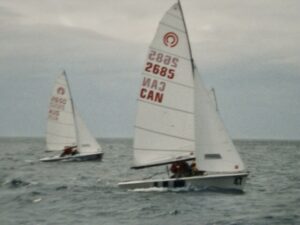
In light of these events, supporting U.S. Sailing may involve advocating for transparency, accountability, and effective leadership within the organization. By encouraging constructive dialogue, adherence to ethical standards, and a focus on promoting the sport of sailing in a positive manner, individuals can contribute to fostering a healthy and thriving sailing community under U.S. Sailing’s governance.
The election process for the CEO, president, and board members involves voting by the current adult and family members of US Sailing. The election is typically held annually, and all eligible members have the opportunity to vote for candidates running for these positions. The elected individuals then assume their roles within the organization based on the election results3.
The voting members of the Board of Directors at US Sailing are selected based on specific criteria outlined in the organization’s Bylaws. These voting members collectively have extensive experience or ability in various areas related to sailing, such as club sailing, community sailing, sail training/education, youth sailing, sailboat racing, race administration, cruising, offshore sailing, and sailing industry experience. They are also required to have demonstrated management and leadership skills, strong presentation and communication abilities, personal sailing experience, and a willingness to serve. Additionally, voting members of the Board must have the highest personal and professional integrity2.
Role of U.S. Sailing in the Sport of Sailing
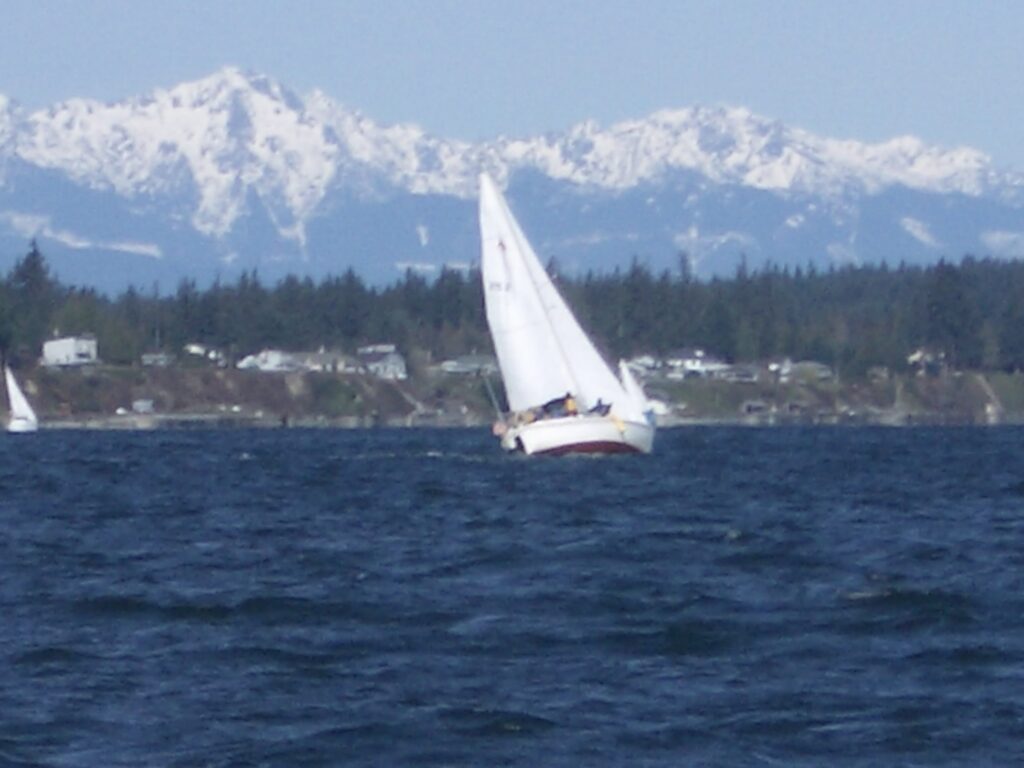
U.S. Sailing plays a pivotal role in the sport of sailing by providing leadership, integrity, and advancement within the sailing community. As the national governing body for sailing in the United States, U.S. Sailing has a multifaceted mission and vision that encompasses various aspects of the sport125.
Mission and Vision:
- Mission: U.S. Sailing aims to increase sailing participation and excellence through education, competition, and equal opportunity while upholding principles of fair play, sportsmanship, and safety.
- Vision: The organization envisions sailing as a rapidly growing sport in the U.S., driven by innovations in access and education, inspired by American success in international competition, and embraced by the public as inspiring, inclusive, and accessible.
Key Functions and Initiatives:
- Training and Education:
- Ensuring standardized rules and sailing instructions.
- Training and certifying race officials, judges, umpires, instructors, and sailors.
- Providing safety courses like Safety at Sea Courses.
- Support for Different Sailing Communities:
- Hosting networking events, symposiums, and championships.
- Organizing USA Junior Olympic Sailing Festivals for young sailors.
- Issuing rating certificates for offshore events.
- Olympic Representation:
- Selecting and training athletes to represent the U.S. at the Olympic Games.
- Managing the U.S. Sailing Team for international competitions.
- Community Engagement:
- Engaging members and volunteers to support the organization’s initiatives.
- Establishing partnerships to increase access to youth sailing in underserved communities.
Objectives:
- Provide leadership, integrity, and advancement for the sport of sailing.
- Be a recognized leader in training, certification, racing support, and facilitating access to sailing.
- Promote participation, education, opportunity, safety, and competitive sailing.
- Achieve success at the highest levels of international competition.
- Strengthen governance and organizational efficiency.
In summary, U.S. Sailing’s role extends beyond governance to encompass training, education, safety standards, competitive opportunities, community engagement, and fostering excellence in sailing at all levels within the United States125.
Benefits of Becoming a Member of U.S. Sailing
Becoming a member of U.S. Sailing offers a range of benefits that cater to individuals, organizations, and corporations involved in the sport of sailing. These benefits aim to enhance the sailing experience, promote safety, provide educational resources, and foster community engagement within the sailing community124.
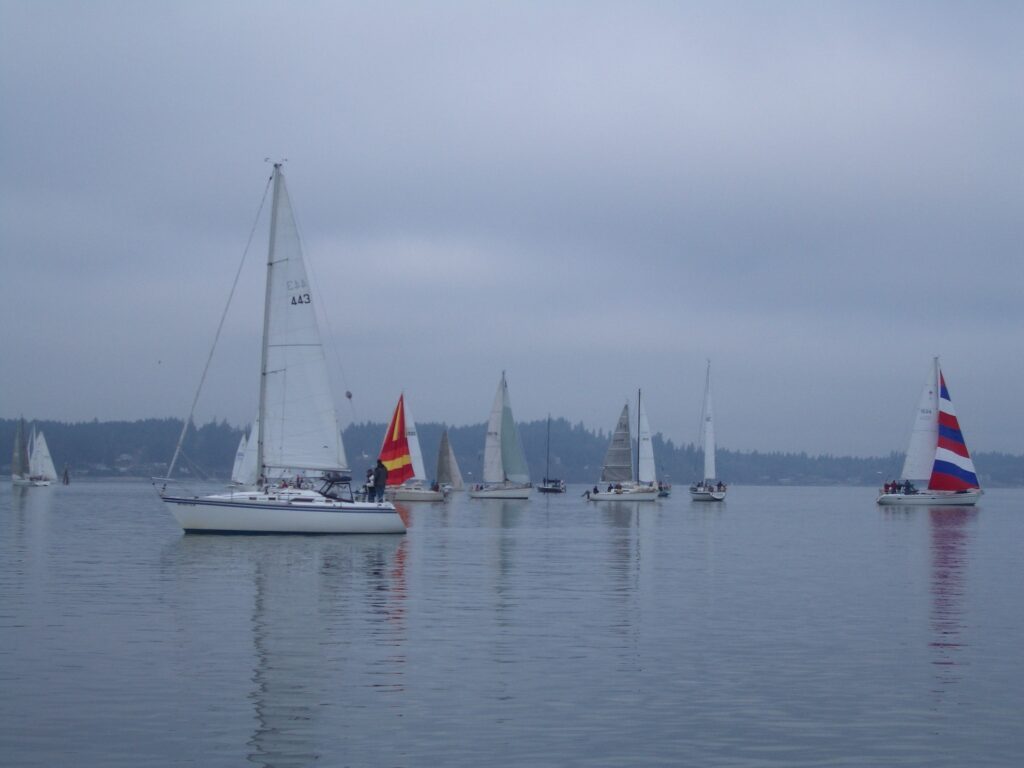
Membership Benefits for Individuals:
- Access to Resources:
- Special discounts on marine insurance components.
- Member-only pricing on US Sailing products and publications.
- Savings on sailing products from various partners and affiliates.
- Education Programs:
- Utilize the Skill Up youth development mobile app for teaching sailing.
- Opportunities to become an Accredited School with US Sailing.
- Access to instructor courses and race official trainings.
- Publicity & Marketing:
- Listing events on the US Sailing online event calendar.
- Updating listings in the Where to Sail Database to promote sailing opportunities.
- Hosting US Sailing Championships and displaying the US Sailing logo on organization websites.
Membership Benefits for Organizations and Corporations:
- Savings & Discounts:
- Discounts on marine insurance components and marine products.
- Participation in the Member Value Partner Program offering discounted memberships and credits for products and services.
- Publicity & Marketing Opportunities:
- Listing events, updating sailing opportunities, and hosting championships.
- Displaying the US Sailing logo on organization websites to show affiliation with the nationally recognized sailing authority.
Additional Benefits for American Sailing Association (ASA) Members:
- Access to emergency services through DAN Boater with a 50% discount on family membership.
- Discounts on products from over 50 partners and affiliates.
- Subscription discounts for sailing publications like Sailing Magazine and Cruising World.
- Opportunities to participate in sailing events worldwide organized by ASA.
In conclusion, joining U.S. Sailing not only provides access to valuable resources, education programs, and discounts but also fosters a sense of community, safety awareness, and professional development within the diverse world of sailing124.
U.S. Sailing Funding and Olympic Selection
Funding from the Federal Government:
U.S. Sailing receives funding from the U.S. Olympic & Paralympic Committee (USOPC) for its Olympic program. However, Sailing was removed from the Paralympics program after the 2016 Rio Games.
It was initially introduced as a demonstration sport in 1996 and became an official sport from 2000 to 2016. The International Paralympic Committee (IPC) removed sailing from the Tokyo 2020 Paralympic Sports Program in January 2015 for failing to meet worldwide reach criteria. The sport, like keelboat sailing, didn’t have enough global participation to justify its inclusion.
The Paralympics used keelboats with the Sonar class for three-person team events allowing for a mix of disabilities among crew members. Keelboat sailing was dropped from the Olympic Games after the 2000 Sydney Olympics.
The decision to remove keelboat events was part of a broader effort by the International Sailing Federation (ISAF), now known as World Sailing, to streamline the Olympic sailing program and focus on classes that are more accessible and popular worldwide.
The USOPC funding is earned through a combination of on-the-water performance and adherence to the signed athlete agreement1. The funding is focused on the Games team until the conclusion of the Summer Olympics, with additional funding announced after the Games aligned with the Tier structure based on World Championship results1.
Olympic Team Selection:
The U.S. sailors for the Olympic Games are selected based on their performance in specific qualifying events. As of the latest update, U.S. Sailing declared winners in five of the Olympic sailing disciplines at the U.S. Olympic Team Trials – Sailing, which took place in January 2024. Athletes like Dominique Stater (Women’s iQFOiL) and the 49er team of Ian Barrows and Hans Henken have been confirmed to represent Team USA. Other athletes have completed the first part of their two-part process to qualify for the Olympics in Marseille4.
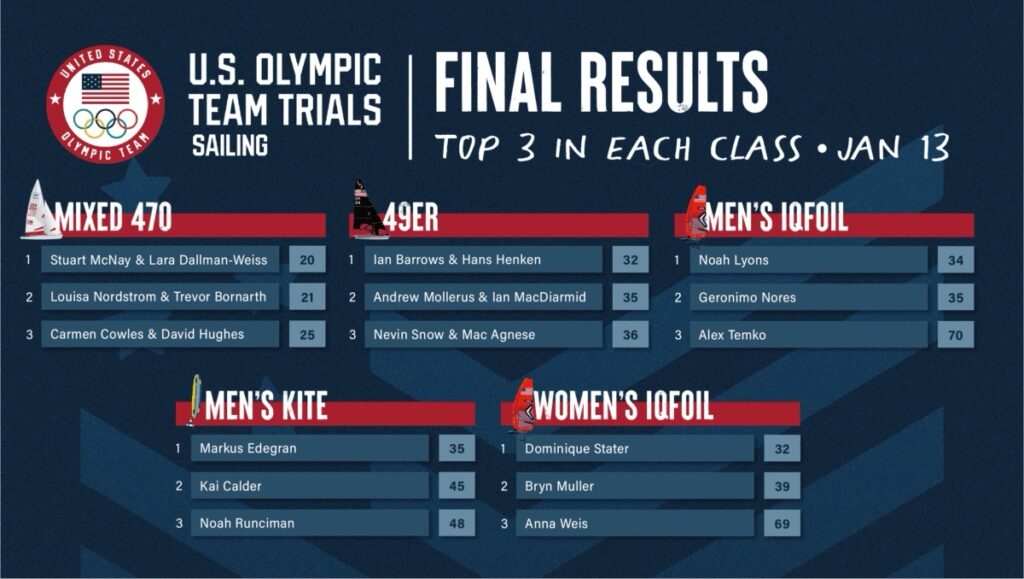
The selection procedures for the 2024 Olympic Games were published and amended by U.S. Sailing’s International Selection Committee (ISC) and the USOPC, with the latest amendment on January 8, 20243.The sailing events for the 2024 Olympic Games will take place in Marseille, France, from July 28 to August 8, 20243.
Challenges Faced by US Sailors in Winning Olympic Events
The quest for American sailors to clinch victory in Olympic events is fraught with challenges that have hindered their success on the international stage. Here are some of the key obstacles faced by US sailors in their pursuit of Olympic glory:
- Perception as an Elitist Sport: Sailing is often perceived as an elitist sport, creating barriers to entry for aspiring sailors from diverse backgrounds. This perception can limit the talent pool and hinder the development of a more inclusive and competitive sailing community1.
- Lack of Public Exposure: Sailing struggles with limited exposure to the public, leading to a lack of widespread interest and engagement in the sport. The presentation of sailing events at the Olympics has been criticized for not effectively showcasing the excitement and intricacies of the races, failing to captivate both sailors and non-sailors alike1.
- Financial Constraints: Unlike some countries with government funding for Olympic sports, there is no government funding specifically allocated for Olympic sailing in the USA. American sailors heavily rely on support from the sailing community and private donors to fund their training and participation in Olympic events2.
- Leadership and Operational Challenges: Recent investigations by the USOPC highlighted issues within US Sailing’s Olympic operations, including complaints of wrongful behavior by former team leaders, lack of athlete representation in leadership positions, and concerns about transparency and governance within the organization4.
- Retaliation and Fear: Athletes have reported fears of retaliation for raising concerns within US Sailing or the US Olympic & Paralympic Committee (USOPC). This has led to an investigation by the USOPC, confirming complaints of wrongful behavior by former team leadership, which included retaliation and public disparagement. Such an environment can create fear among athletes to speak up and may lead to reduced resources for athletes3.
- Competitive Landscape: The competitive landscape in Olympic sailing is intense, with countries like Great Britain overtaking the USA in all-time sailing medals. Despite a rich history of successful American sailors, recent performances have fallen short of expectations, indicating a need for strategic improvements and revitalization within the US Olympic Sailing Team5.
Addressing these challenges will require concerted efforts to enhance accessibility, promote public engagement, secure sustainable funding sources, improve governance and leadership structures, and elevate the overall competitiveness and performance of American sailors on the global Olympic stage. By overcoming these obstacles, US sailors can strive towards reclaiming their position as formidable contenders in Olympic sailing events.
JJ Fetter
JJ Fetter, born Jennifer Anne Fetter on December 1, 1963, in La Jolla, California, is a distinguished figure in the world of sailing, recognized for her remarkable achievements and contributions to the sport. Her career highlights include:

- Olympic Success: Fetter has won two Olympic medals in sailing, securing a bronze in 1992 and a silver in 2000, both in the 470 class14.
- World Championships: She has won the World Championships in the 470 class in 1991, showcasing her skill and competitiveness on a global stage1.
- Rolex Yachtswoman of the Year: Fetter has been honored with the prestigious Rolex Yachtswoman of the Year award a record four times, reflecting her excellence and consistent performance in sailing13.
- America’s Cup Involvement: In 1995, she was the tactician and starting helmsperson for the America3 Women’s America’s Cup team, Mighty Mary, highlighting her strategic acumen and leadership in one of sailing’s most prestigious competitions13.
- Educational Background: Fetter’s sailing journey began at a young age, and she was a college all-American at Yale, where she further honed her skills and passion for the sport1.
- Coaching and Community Involvement: Beyond her competitive achievements, Fetter has contributed to the sailing community as a coach, including coaching the Francis Parker High School sailing team, and has been involved in organizing sailing events36.

Fetter’s career is characterized by her versatility across different boats and racing formats, her pioneering role in women’s sailing, and her engagement in the broader sailing community. Her achievements and dedication have made her a role model and an influential figure in promoting and developing the sport of sailing134.

Paul Cayard
Paul Cayard is a highly accomplished American sailor and sailing executive with a distinguished career in both competitive sailing and leadership roles within the sport. Born on May 19, 1959, in San Francisco, California, Cayard has achieved significant success across a wide range of sailing disciplines and events.

Here are some key highlights of his career:
- Whitbread Round the World Race Victory: Cayard skippered EF Language to victory in the 1997-1998 Whitbread Round the World Race (now known as The Ocean Race), showcasing his skill in one of the most challenging offshore sailing competitions.
- America’s Cup Competitor: He has competed in multiple America’s Cup campaigns, including serving as the skipper for the AmericaOne challenge in 2000, where his team reached the finals of the Louis Vuitton Cup.
- Olympic Campaigns: Cayard has also competed in the Olympic Games, representing the United States in sailing.
- World Championships: Throughout his career, Cayard has won several world championships in different sailing classes, further establishing his versatility and competitiveness on the global stage.
- Sailing Hall of Fame: Recognizing his contributions to the sport, Cayard was inducted into the National Sailing Hall of Fame, an honor that reflects his achievements and impact on sailing.
- Leadership Roles: Beyond his competitive achievements, Cayard has taken on significant leadership roles within the sailing community. He has been involved in efforts to promote sailing, develop young talent, and lead organizations dedicated to the sport.
- Chairman of the Board at Saint Francis Yacht Club In this role, Cayard is involved in guiding the club’s strategic direction and supporting its various initiatives. The St. Francis Yacht Club is a prestigious sailing organization based in San Francisco, and Cayard’s leadership is integral to its operations and influence within the sailing community.
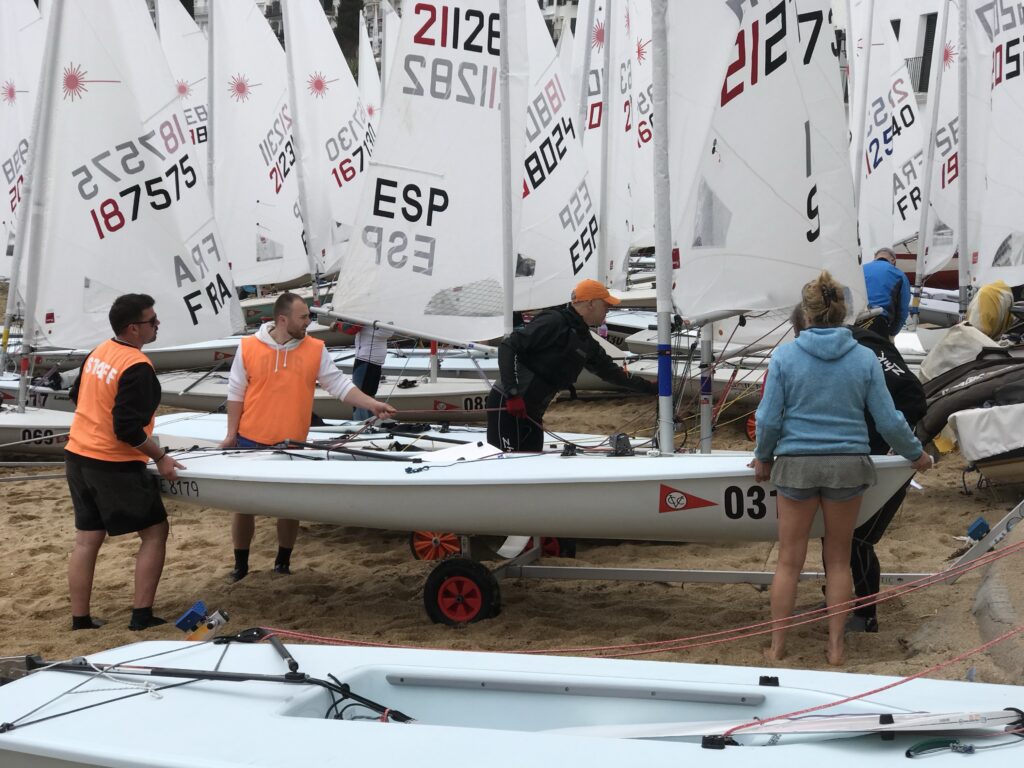
Paul Cayard’s career is marked by his competitive success, leadership, and dedication to advancing the sport of sailing. His contributions have left a lasting impact on the sailing world, both in the United States and internationally.
Sally Barkow
Sally Barkow, a prominent figure in the sailing community, has a strong background and qualifications that have contributed to her role at U.S. Sailing. Here are some key qualifications and experiences of Sally Barkow:
- Sailing Representative: Sally Barkow served as the sailing representative of the U.S. Olympic and Paralympic programs, showcasing her expertise and involvement in high-level sailing competitions2.
- Athletic Background: Barkow’s athletic background includes being part of the sailing team at Old Dominion University, where she honed her skills and passion for the sport4.
- Professional Experience: With her extensive experience in competitive sailing, Barkow brings a wealth of knowledge and expertise to her role at U.S. Sailing, contributing to the organization’s programs and initiatives12.
- Olympic Program Involvement: Her involvement in the U.S. Sailing Olympic Program highlights her commitment to promoting excellence in sailing and supporting athletes on their Olympic journeys2.
Sally Barkow’s qualifications reflect her dedication to the sport of sailing, her competitive achievements, and her role in advancing sailing programs and opportunities within U.S. Sailing.
Notable Achievements of Sally Barkow in Sailing:
Sally Barkow, a highly accomplished sailor, has a remarkable list of achievements that highlight her skill, dedication, and success in the sport of sailing:
- Two-Time US SAILING Rolex Yachtswoman of the Year: Barkow was honored with the prestigious US SAILING Rolex Yachtswoman of the Year award twice, in 2005 and 2007, recognizing her outstanding performance and contributions to sailing1.
- Three-Time Winning Skipper: She achieved success as a three-time winning skipper in US SAILING’s Rolex International Women’s Keelboat Championships in 2003, 2005, and 2007, showcasing her leadership and competitive prowess in women’s keelboat racing1.
- Intercollegiate Sailing Association All-American: Barkow was recognized as an Intercollegiate Sailing Association All-American in 2001 and 2002 during her time at Old Dominion University, highlighting her excellence in collegiate sailing1.
- Olympic Participation: She represented Team USA in the women’s keelboat event at the Beijing 2008 Olympic Games, demonstrating her talent and commitment to competing at the highest level of international sailing4.
- Volvo Ocean Race Competitor: Barkow’s sailing career also includes competing in the Volvo Ocean Race as a two-time participant in the 2014-2015 and 2017-2018 editions. Her transition from Olympic and match racing to offshore racing showcases her versatility and willingness to take on new challenges in sailing4.
Sally Barkow’s achievements underscore her exceptional talent, leadership skills, and competitive spirit, making her a respected figure in the world of sailing.
William J. Ruh
William J. Ruh, hailing from Del Mar, California, is a prominent figure in the sailing community with a diverse background and extensive experience in both sailing and leadership roles. Here are some key details about William J. Ruh and his sailing credentials:
- Sailing Background: Ruh’s passion for sailing dates back to his early years, where he sailed small boats on lakes with his family and later transitioned to racing yachts globally. He has raced professionally aboard renowned maxi yachts and IOR sailboats from the mid-1980s, showcasing his dedication to the sport1.
- America’s Cup Campaigns: Ruh’s participation in three America’s Cup campaigns in 1983, 1987, and 1992 underscores his involvement at the pinnacle of competitive sailing, demonstrating his skills and expertise in high-stakes racing1.
- Professional Racing: Ruh’s professional racing experience aboard renowned maxi yachts and IOR sailboats during the mid-1980s highlights his commitment to competitive sailing and his success in various racing circuits globally1.
- Leadership Role: As Chair of the US Sailing Foundation and a member of the Association’s Board of Directors, Ruh plays a crucial role in shaping the future of sailing by focusing on youth sailing and Olympic sailing initiatives. His leadership aims to strengthen resources that drive growth, innovation, and excellence in the sport1.
- Strategic Planning: Ruh’s strategic vision for the US Sailing Foundation focuses on developing resources that enhance growth, innovation, and excellence within the sport of sailing. His proposed initiatives have garnered unanimous approval from both the US Sailing Association and US Sailing Foundation Board members, reflecting his ability to drive positive change within the organization2.
- Professional Experience: Beyond sailing, Ruh has managed private equity firms and served on various boards of banking, financial services, and technology companies. His diverse professional background complements his contributions to the sailing community through strategic leadership and development of resources1.
William J. Ruh’s blend of sailing expertise, leadership acumen, and commitment to advancing the sport underscores his significant role within US Sailing and the broader sailing community.
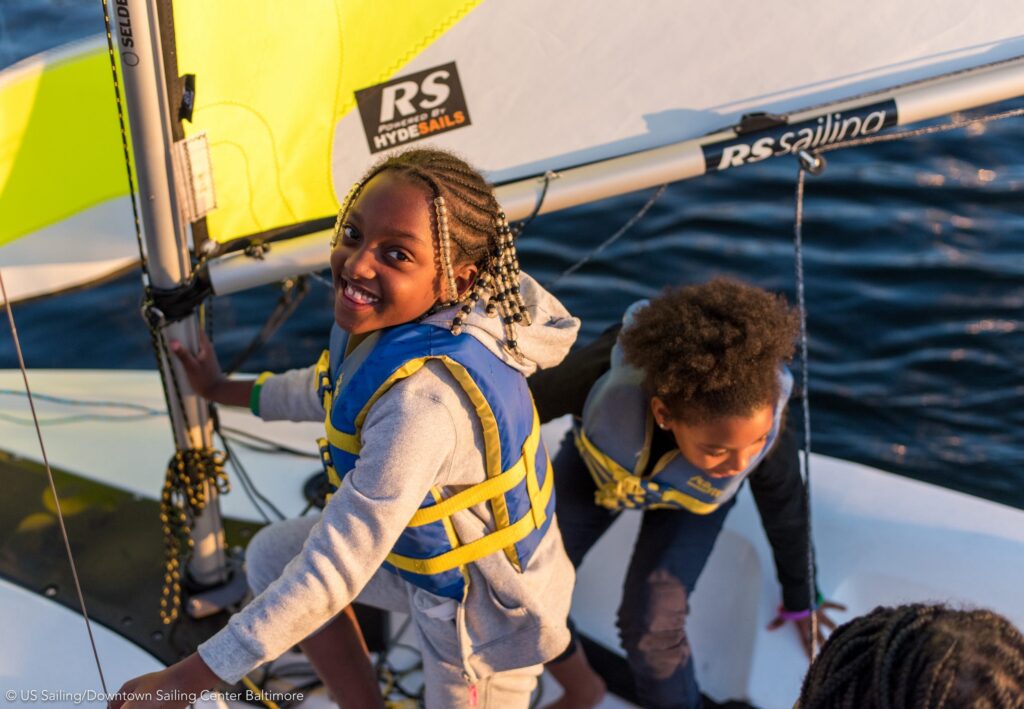
Once upon a time, in the realm of sailing, the United States found itself in a drought at the Olympics, unable to secure victory in any event. Amidst this struggle, U.S. Sailing faced scrutiny for missteps and law suits that hindered the interest of American athletes.
However, amidst this backdrop of challenges, a tale of transformation and triumph emerged through the journey of a fictional character navigating the waters of college sailing.
Meet Sarah, a young and ambitious sailor with dreams as vast as the ocean and parents who while not sailors were Olympic athletes when they were younger. Sarah’s path through college sailing took an unexpected turn when she crossed paths with an Olympic-winning sailor from abroad, not native to the USA who were friends of her parents. This seasoned champion, with a wealth of experience and wisdom, became Sarah’s coach and mentor.
Under the guidance of this Olympic victor, Sarah embarked on a transformative journey. Through dedication, perseverance, and expert coaching, Sarah honed her skills, navigated challenges, and embraced the essence of true champions. She learned that champions are not merely born; they are crafted through resilience, hard work, and unwavering determination. And they may not need a national organization to make the Olympic team.
As Sarah sailed through collegiate competitions, she embodied the spirit of excellence instilled by her coach. With each race won and obstacle overcome, Sarah’s prowess on the water grew stronger. She embodied the values of fair play, sportsmanship, and unwavering dedication to her craft.
Through Sarah’s narrative, intertwined with the real-life struggles and triumphs within U.S. Sailing and the Olympic sailing community, a tale of hope and inspiration emerged. It showcased that champions are not defined by borders but by their unwavering spirit and commitment to greatness. In the vast expanse of the sea and under the guidance of a mentor from distant shores, Sarah’s journey epitomized how true champions are made – through passion, perseverance, and the guidance of those who have conquered the waves before them.
Settled
Tobias, the last American to win an Olympic sailing gold medal, at the 2008 Beijing Games, emailed U.S. Sailing president Richard Jepsen and board members on April 24 asking them to drop the lawsuit. She called it “a frivolous and embarrassing side show for U.S. Sailing” and “a distraction from the goals.”
“Let’s broker peace and get the USA Olympic program back to a level where my name is in the history books and not the last USA sailing Gold Medal winner,” . .. she was so convinced that the U.S. team was on the right track under Cayard’s leadership and America One’s financial support that she gave up her job as coach for the ILCA 6 squad in the middle of the current quad and tried to make the team. Although she lost at the trials, she said she wouldn’t have gotten to the starting line without America One’s support.“The leadership change was a shock to many athletes and the reasons for the organizational changes didn’t ring true to many of us, however funding was a concern so many chose to walk the path without ‘rocking the boat’ as it were keeping a low profile during the resulting fallout,” she wrote.
In an embarrassment on the English Channel in 2012, the United States failed to win an Olympic sailing medal for the first time since the 1936 Berlin Games. San Diego’s Caleb Paine won a bronze medal in Rio de Janeiro in 2016, but the Americans were shut out again three summers ago in Tokyo and have been overtaken by Britain on the sailing medals table.Some of the biggest names in sailing won Olympic medals for the United States. They include the late sailmaker Lowell North; the late Buddy Melges, who co-helmed the 1992 America’s Cup winner with industrialist Bill Koch; sailmaker Mark Reynolds; and even Mr. America’s Cup himself, Dennis Conner.
Paris 2024 Olympics Results
The last time a U.S. sailor won an Olympic medal was at the Rio 2016 Olympics, when Caleb Paine secured a bronze in the Finn class. Ian Barrows and Hans Henken achieved a bronze medal in the Men’s Skiff (49er) event at the Paris 2024 Olympics, marking the first U.S. sailing medal since 2016.
2024 Olympic Sailing and Boat-Related Event Results
Men’s Skiff (49er)
- Gold: Spain (Diego Botín and Florian Trittel)
- Silver: New Zealand (Isaac McHardie and William McKenzie)
- Bronze: United States (Ian Barrows and Hans Henken)
Women’s Skiff (49erFX)
- Gold: Netherlands (Odile van Aanholt and Annette Duetz)
- Silver: Sweden (Vilma Bobeck and Malin Netzler)
- Bronze: France (Aloïse Retornaz and Camille Lecointre)
Mixed Multihull (Nacra 17)
- Gold: Italy (Ruggero Tita and Caterina Banti)
- Silver: Great Britain (John Gimson and Anna Burnet)
- Bronze: Australia (Jason Waterhouse and Lisa Darmanin)
Men’s Windsurfing (iQFOiL)
- Gold: Netherlands (Kiran Badloe)
- Silver: France (Thomas Goyard)
- Bronze: Israel (Yoav Cohen)
Women’s Windsurfing (iQFOiL)
- Gold: Great Britain (Emma Wilson)
- Silver: France (Hélène Noesmoen)
- Bronze: Poland (Zofia Klepacka)
Men’s Kiteboarding (Formula Kite)
- Gold: Singapore (Maximilian Maeder)
- Silver: Slovenia (Toni Vodisek)
- Bronze: Italy (Riccardo Pianosi)
- USA Result: Markus Edegran finished 9th
Women’s Kiteboarding (Formula Kite)
- Gold: France (Lauriane Nolot)
- Silver: Great Britain (Ellie Aldridge)
- Bronze: Spain (Gisela Pulido)
- USA Result: Daniela Moroz finished 4th
Mixed Dinghy (470)
- Gold: France (Camille Lecointre and Jérémie Mion)
- Silver: Japan (Keiju Okada and Miho Yoshioka)
- Bronze: Spain (Jordi Xammar and Nora Brugman)
- USA Result: Stu McNay and Lara Dallman-Weiss participated
Women’s Dinghy (ILCA 6)
- Gold: Denmark (Anne-Marie Rindom)
- Silver: Belgium (Emma Plasschaert)
- Bronze: Greece (Vasileia Karachaliou)
- USA Result: Erika Reineke participated
Men’s Dinghy (ILCA 7)
- Gold: Australia (Matt Wearn)
- Silver: Croatia (Tonci Stipanovic)
- Bronze: Cyprus (Pavlos Kontides)
- USA Result: The USA did not qualify for this event
Ian Barrows and Hans Henken: Profiles and Olympic Preparation
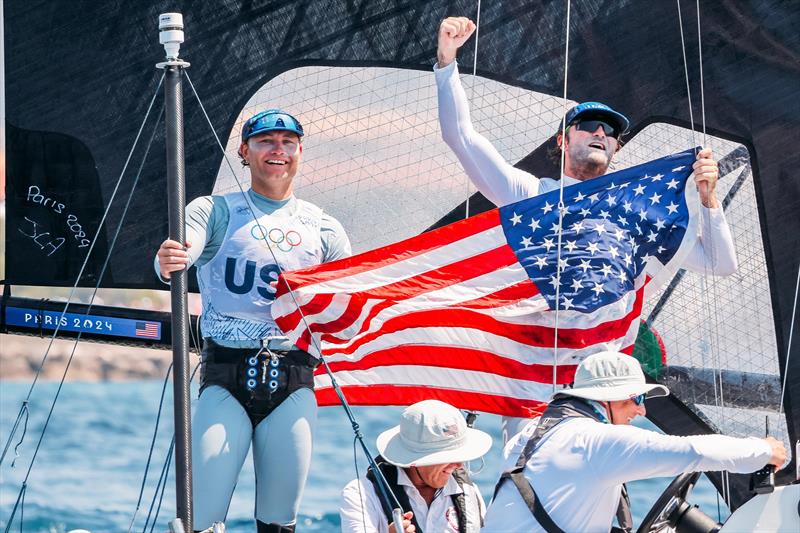
Ian Barrows
- Background: Ian Barrows is from St. Thomas, U.S. Virgin Islands. He began his sailing career in Optis and later transitioned to larger dinghies like 420s, Lasers, and Bytes. He was a standout sailor at Yale University, where he helped the team win eight National Championships and was named a four-time collegiate All-American and College Sailor of the Year in 2017.
Hans Henken
- Background: Hans Henken is from San Francisco, California. He started sailing at six years old in the Naples Sabot. Henken has competed at high levels, primarily in 29ers, 49ers, and the International Moth, and has been involved in the SailGP circuit. He studied Aeronautical and Astronautical Engineering at Stanford University, where he was also a key member of the sailing team.
Sailing Competitions and Preparation
- Team Formation: Barrows and Henken teamed up in 2021, focusing on the 49er class with the goal of competing in the Paris 2024 Olympics. They secured their Olympic spot by winning the U.S. Olympic Team Trials – Sailing in Miami in January 2024.
- Competitions:
- 2022: Participated in the Allianz World Sailing World Cup (5th place) and the 49er World Championships (11th place).
- 2023: Competed in the Princess Sofia Regatta and the French Olympic Week, finishing 7th in the latter.
- 2024: Achieved a bronze medal in the Men’s Skiff (49er) event at the Paris 2024 Olympics, marking the first U.S. sailing medal since 2016.
Coaching and Relationship with US Sailing
- Coaching: While specific coaches for Barrows and Henken are not detailed in the search results, they are part of the US Sailing Team, which provides support and resources for Olympic-level athletes. Marcus Lynch, the US Sailing Team High Performance Director, acknowledged their hard work and dedication in securing the bronze medal.
- US Sailing: Both sailors have been integral members of the US Sailing Team, which supports their training and competition efforts. Their achievements are a testament to their commitment and the resources provided by US Sailing.
- The AmericaOne Foundation has been a significant supporter of U.S. sailors, providing both direct and indirect assistance. The foundation has contributed over $6 million to US Sailing and its athletes over the past 15 years. This includes direct financial support, coaching, fitness guidance, and logistical assistance for various events and training camps. In the six months prior to the 2024 Olympics alone, AmericaOne provided $1.5 million in direct support, including on-the-water coaching, physical fitness guidance, and financial assistance for Olympic Trials.
US Olympic Sailing Success
Ian Barrows and Hans Henken’s journey to the 2024 Olympics highlights their dedication and the effective partnership they have built. Their success at the Paris 2024 Olympics underscores their skill and the support they have received from US Sailing.


